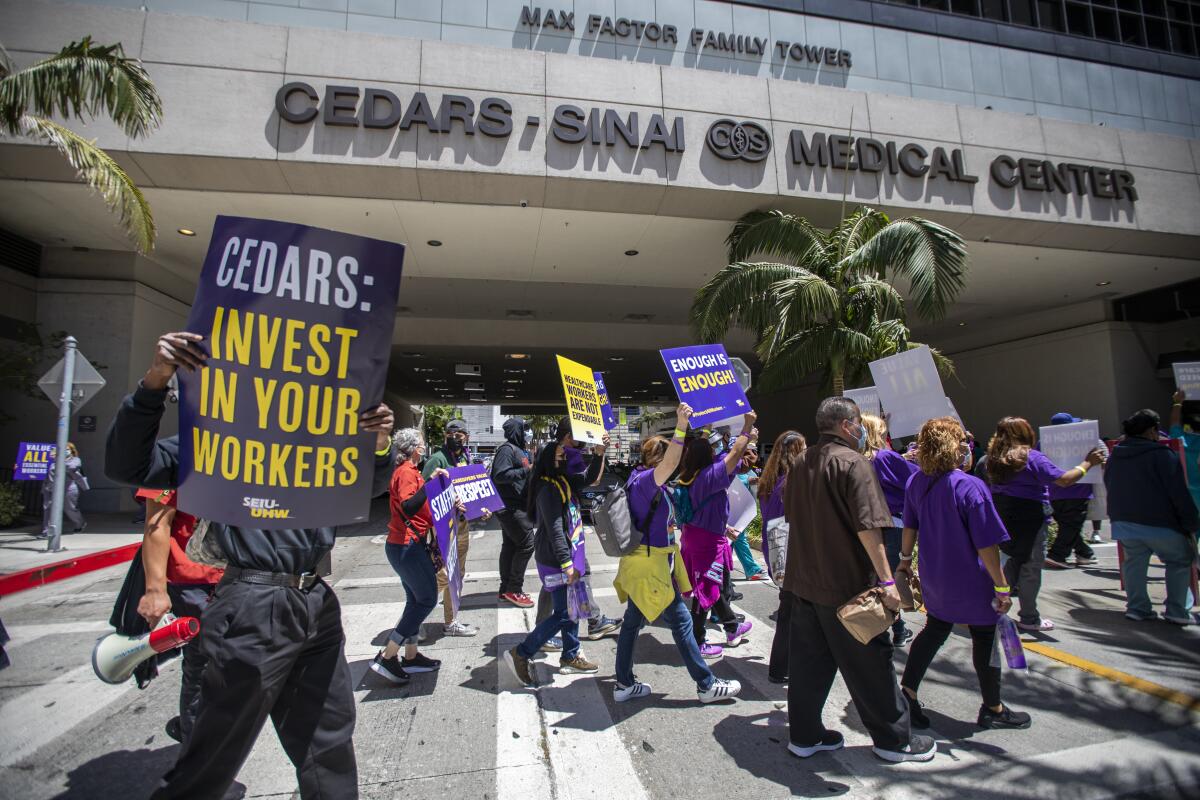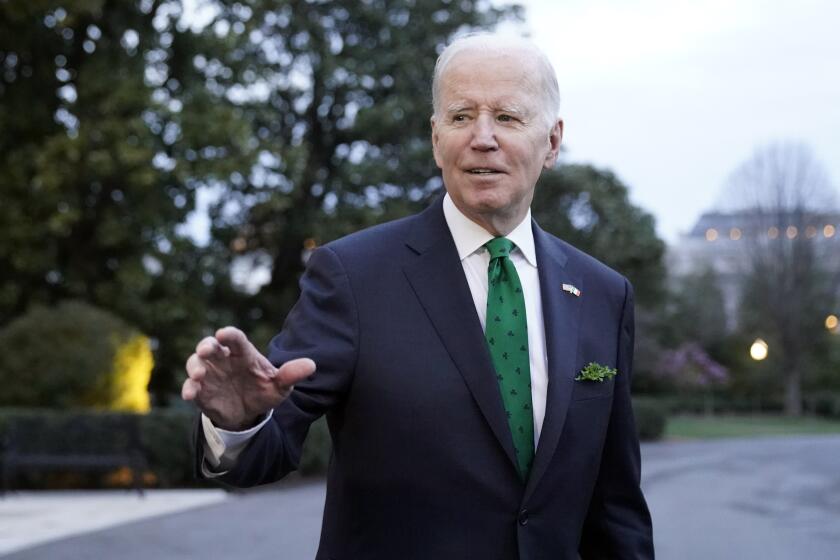L.A. voters could clamp down on pay for hospital executives

- Share via
Los Angeles voters will decide next spring whether to clamp down on pay for hospital executives, capping their total wages and other compensation at $450,000 annually, after the Los Angeles City Council voted Wednesday to put the proposed measure on the March 2024 ballot.
The L.A. ballot measure is backed by a union representing healthcare workers, which argues pay for hospital executives has been excessive and out of line with the mission of providing affordable care.
SEIU-United Healthcare Workers West contends that hospital executives should not be making any more than the total compensation of the president of the United States, which the ballot measure states is currently $450,000.
The California Hospital Assn. has gone to court to stop a ballot measure that would limit the annual compensation for executives at privately owned hospitals.
“Health care executives receive lavish, million-dollar salaries far above the wages of health care workers, and patients struggle to afford basic care. The current compensation structure incentivizes wealthy executives to keep the system the same,” SEIU-UHW spokesperson Renée Saldaña said in a statement. “Excessive executive compensation diverts funds to a small group of individuals that could be invested in expanding access to high-quality, affordable care for everyone.”
The Hospital Assn. of Southern California called the proposal “deeply flawed” and argued that it would make it harder for Los Angeles hospitals to recruit and retain top talent, who would instead opt to work at healthcare facilities in other cities.
That would “ultimately compromise the quality and affordability of health care in the city,” the association wrote to the council.
The measure “won’t do anything to reduce health care costs or improve the quality of care in the community,” said Jan Emerson-Shea, vice president of external affairs for the California Hospital Assn. “On the contrary, it will only make it more difficult to recruit qualified hospital leaders, including physicians and nurse leaders.”
After supporters of the measure succeeded in gathering enough signatures, council members had the option of either putting the proposal on the ballot or simply adopting it. The council voted 10 to 0 to send the proposal to the ballot for voters to decide, with Councilmember John Lee recusing himself as a board member at West Hills Hospital.
Earlier this year, the California Hospital Assn. sought unsuccessfully to stop the measure in court, arguing that voters had been misled because a range of additional payments and benefits bring the overall compensation for the U.S. president well above the $450,000 amount cited by SEIU-UHW. In April, a judge turned the association down, allowing the measure to move forward.
The proposed measure would cap executive compensation for a range of top officials, including CEOs, chief financial officers, executive vice presidents and administrators, at privately owned hospitals and their affiliated clinics, skilled nursing facilities and residential facilities for the elderly located in the city of Los Angeles.
The cap would not apply to any medical professionals whose “primary duties” are providing medical services or direct care to patients.
If hospital executives receive more than the annual limit, they must refund that money plus interest. Breaking the law would lead to penalties of up to $1,000 per violation, and each day a violation is committed or continues would count as another violation.
Get the lowdown on L.A. politics
Sign up for our L.A. City Hall newsletter to get weekly insights, scoops and analysis.
You may occasionally receive promotional content from the Los Angeles Times.
The annual cap would apply not just to wages, but a range of compensation for Los Angeles hospital executives including paid time off, bonuses, travel, housing payments, stock options and severance.
SEIU-UHW said at least 22 executives would be affected by the measure, but the number is likely higher because its analysis of publicly available information did not include for-profit hospitals. It is now pursuing similar measures in the cities of Chula Vista and La Mesa, Saldaña said.
The union has pushed before to limit pay for hospital executives, including a statewide ballot measure that was dropped nine years ago after SEIU-UHW reached an agreement with hospitals.
It has spotlighted pay packages exceeding $1 million annually for executives at hospitals and health systems such as Cedars-Sinai, where the top executive received more than $6 million in compensation through the medical center and related organizations in a recent year, according to tax filings.
Cedars-Sinai said in a statement that setting its executive compensation involves “an assessment by outside, independent experts,” and that if the ballot measure passed, “we would be unable to recruit and retain clinical, academic and management leaders who have made us a world-renowned academic medical center.”
The latest proposal to curb executive pay comes as the hospital industry has sought to fend off $25-an-hour healthcare worker wage measures that are backed by SEIU-UHW. An L.A. measure championed by the union was put on hold after hospital groups successfully pushed for a referendum.
The California Hospital Assn. has also been fighting a state bill, SB 525, that would hike wages to at least $25 an hour in coming years for workers at a range of healthcare facilities and agencies, including hospitals, skilled nursing facilities, clinics and home health agencies.
More to Read
Sign up for Essential California
The most important California stories and recommendations in your inbox every morning.
You may occasionally receive promotional content from the Los Angeles Times.















